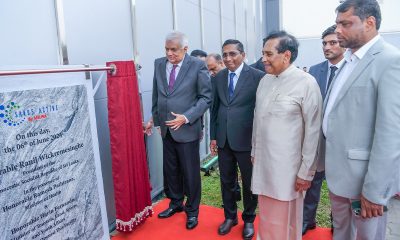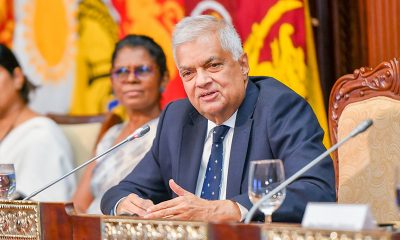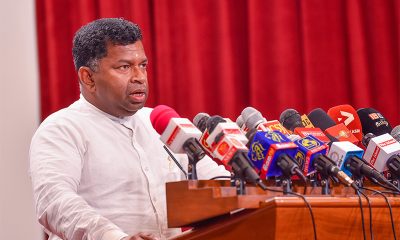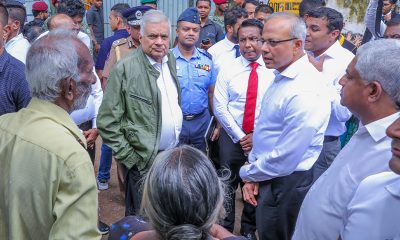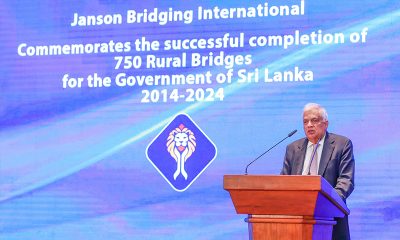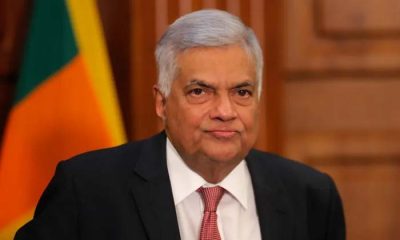News
Prez champions digital infrastructure for Lanka’s economic renaissance
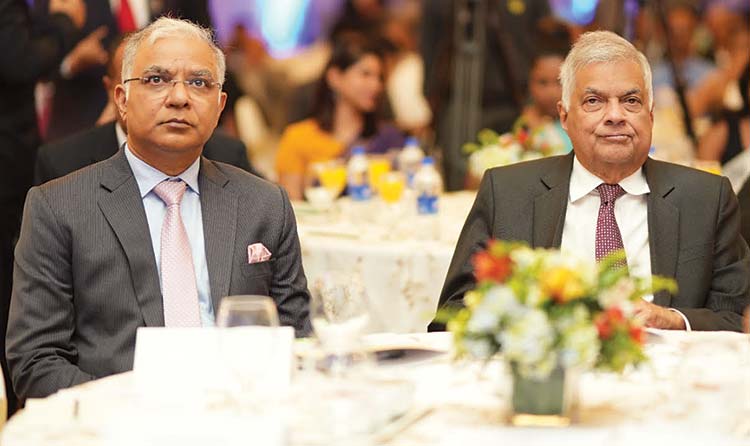
By Harischandra Gunaratna
President Ranil Wickremesinghe recently delivering the keynote address at the Digital Public Infrastructure Conference organized by the Indian High Commission in Colombo at the Taj Samudra Hotel, underscored the importance of digital infrastructure in modernizing agriculture, addressing multi-dimensional poverty and reforming the education system.
Wickremesinghe characterized the country’s economy as a ‘patchwork economy’ calling it a symphony of desperate elements stitched together.
Acknowledging the importance of digitization, the President highlighted the significance of discussions on the digital public economy whilst outlining the government’s plans to establish a new institutional framework to facilitate this transition, moving away from the existing structures such as IT Councils and focusing on creating a Digital Transformation Agency and AI Centre, allocated with a budget of one billion rupees. He said the agency would be building a robust economy, departing from the previous approaches which failed to yield the desired results.
The President expressed gratitude to the Indian government for its support, in advancing Sri Lanka’s digital economy, highlighting plants to collaborate with Indian institutions and leverage their expertise, particularly establishing a campus of the Chennai Indian Institute of Technology(IIT) and additionally planning to launch three universities, two of which will focus on technology.
Indian High Commissioner to Sri Lanka Santosh Jha in his welcome address said India’s own journey stands as testimony to the power of Digital Public Infrastructure (DPI). The digital transformation in India over the last decade or so has been driven by these inter operable and open protocols of DPI.
The High Commissioner said that India’s DPI journey started with the basic need to provide direct access to public services and Government benefits to its citizen.
“This what gave birth to India’s Digital Identity Number AADHAAR- and the Unique Identification Authority of India in 2016. This became the foundational building block of DPI and the magic began.
At the heart of this magic is what we call India Stack: – government-backed APIs, or Application Programming Interfaces, upon which third parties can build software with access to government IDs, payment networks and data Jha said.
This digital infrastructure in inter operable and “stacked together – meaning that private private companies can build apps integrated with state services to provide consumers with seamless access to everything from welfare payments to loan applications and making investments, the High Commissioner stressed.
“Probably even the architects of of AADHAAR didn’t envisage that India was on path to finding a world-beating solution for building out and regulating the online commons that is more equitable than laissez-fare approach, more transparent and more innovative than some of the regulation-heavy models.” he said.
News
US sports envoys to Lanka to champion youth development

The U.S. Embassy in Colombo welcomed the U.S. Sports Envoys to Sri Lanka, former National Basketball Association (NBA) and Women’s National Basketball Association (WNBA) players Stephen Howard and Astou Ndiaye, from June 8 through 14.
The Public Diplomacy section of the U.S. Embassy said that it would launch a weeklong basketball program intended to harness the unifying power of sports, made possible through collaboration with Foundation of Goodness and IImpact Hoop Lab.
While in Sri Lanka, Howard and Ndiaye, both retired professional basketball players, will conduct a weeklong program, Hoops for Hope: Bridging Borders through Basketball. The Sports Envoys will lead basketball clinics and exhibition matches and engage in leadership sessions in Colombo and Southern Province for youth aged 14-18 from Northern, Uva, Eastern and Western Provinces, offering skills and leadership training both on and off the court. The U.S. Envoys will also share their expertise with the Sri Lanka Basketball Federation, national coaches, and players, furthering the development of basketball in the country. Beyond the clinics, they will collaborate with Sri Lankan schoolchildren to take part in a community service project in the Colombo area.
“We are so proud to welcome Stephen and Astou as our Sports Envoys to Sri Lanka, to build on the strong people-to-people connections between the United States and Sri Lanka,” said U.S. Ambassador Julie Chung. “The lessons that will be shared by our Sports Envoys – communication, teamwork, resilience, inclusion, and conflict resolution – are essential for leadership development, community building, equality, and peace. The U.S. Sports Envoy program is a testament to our belief that sports can be a powerful tool in promoting peace and unity.”
News
Rahuman questions sudden cancellation of leave of CEB employees

SJB Colombo District MP Mujibur Rahuman in parliament demanded to know from the government the reasons for CEB suspending the leave of all its employees until further notice from Thursday.
MP Rahuman said that the CEB has got an acting General Manager anew and the latter yesterday morning issued a circular suspending leave of all CEB employees with immediate effect until further notice.
“We demand that Minister Kanchana Wijesekera should explain this to the House. This circular was issued while this debate on the new Electricity Amendment Bill was pending. There are many who oppose this Bill. The Minister must tell parliament the reason for the urge to cancel the leave of CEB employees,” the MP said.However, Speaker Mahinda Yapa Abeywardena prevented Minister Wijesekera responding to the query and said that the matter raised by MP Rahuman was not relevant.
News
CIPM successfully concludes 8th Annual Symposium

The Chartered Institute of Personnel Management (CIPM) successfully concluded the 8th Annual CIPM Symposium, which took place on 31st May 2024. Themed “Nurturing the Human Element—Redefining HRM in a Rapidly Changing World,” the symposium underscored the pivotal role of human resource management (HRM) in today’s dynamic global landscape. Since its inception in 1959, CIPM has been dedicated to advancing the HR profession through education, professional development, and advocacy, solidifying its position as Sri Lanka’s leading professional body for HRM.
Ken Vijayakumar, the President of the CIPM, graced the occasion as the chief guest. The symposium commenced with the welcome address by the Chairperson, Prof. Arosha Adikaram, followed by the Web Launch of the Symposium Proceedings and Abstract Book by the CIPM President. The event featured distinguished addresses, including a speech by Chief Guest Ken Vijayakumar, President of CIPM, and an address by Guest of Honor Shakthi Ranatunga, Chief Operating Officer of MAS Holdings Pvt. Ltd., Sri Lanka.
The symposium also featured an inspiring keynote address by Prof. Mario Fernando, Professor of Management and Director of the Centre for Cross Cultural Management (CCCM) at the University of Wollongong, Australia.
Vote of Thanks of the inauguration session was delivered by Dr. Dillanjani Weeratunga, Symposium Co-chair.
The symposium served as a comprehensive platform for researchers to present their findings across a wide range of critical topics in HRM. These included Cultural Diversity and Inclusion, Talent Development and Retention, Ethical Leadership and Corporate Social Responsibility, Adapting to Technological Advancements, Mental Health and Well-being at Work, Global Workforce Challenges, Employee Empowerment, and Reskilling and Upskilling.
The plenary session was led by Prof. Wasantha Rajapakse. Certificates were awarded to the best paper presenters during the valedictory session, followed by a vote of thanks delivered by Kamani Perera, Manager of Research and Development.
The annual symposium of CIPM was a truly inclusive event, attracting a diverse audience that spanned undergraduates, graduates, working professionals, research scholars and lecturers. This widespread interest highlights the symposium’s significance in the field of HRM, offering a unique opportunity for everyone to network and learn from scholarly brains.The CIPM International Research Symposium was sponsored by Hambantota International Port, Sri Lanka Institute of Information Technology (SLIIT), E B Creasy & Co. PLC, and Print Xcel Company.


